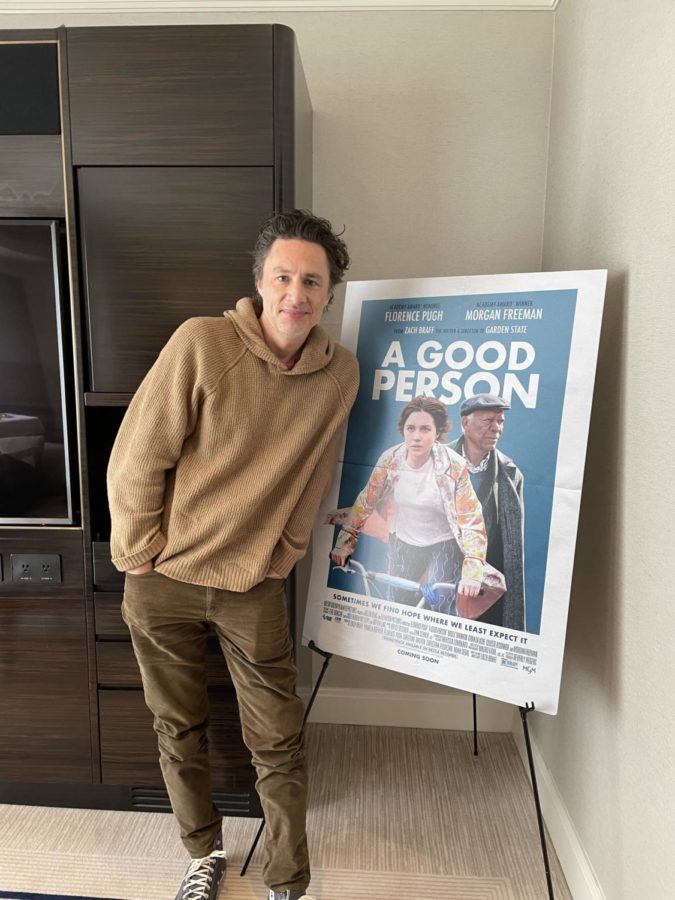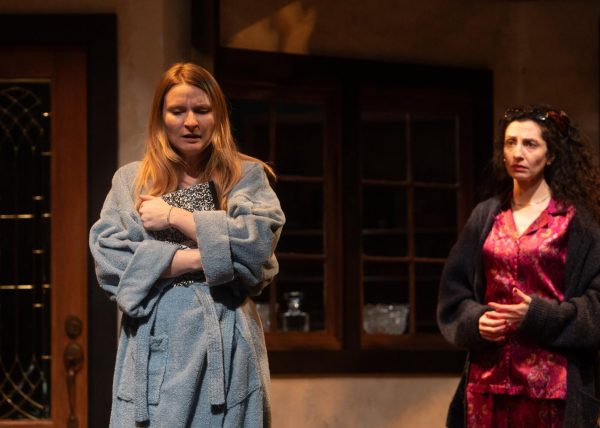Authentic Grief in Zach Braff’s “A Good Person”
Associate Arts Editor Miki Mukawa reviews MGM’s new film “A Good Person” and interviews writer and director Zach Braff in a college roundtable.
Writer and director Zach Braff at the college roundtable for his new film, “A Good Person.”
April 16, 2023
It’s a common trope in movies: the protagonist’s life changes in the flash of a second. A Good Person starts in the same way. We’re introduced to Allison (Florence Pugh) who seemingly has it all: the perfect fiancé (Chinaza Uche), a promising career, and the warm company of family and friends. But after a fatal accident forces her to wrestle with grief and guilt, she loses everything—and falls into a crippling opioid addiction. In an attempt to piece her life back together, she finds herself forming an unexpected friendship with the man who would have been her father-in-law, Daniel (Morgan Freeman).
After watching the trailer, my impression was that, like many other films about addiction, it would explore the ups and downs of the protagonist’s recovery with the help of a wise mentor. But as I walked out of the screening, it was clear that, at its core, A Good Person isn’t about addiction. Rather, it’s a story centered around grief, inspired by Braff’s recent encounters with it.
“I lost my sister, I lost my father, and then the pandemic happened and my best friend, who was living in a little guest cottage I have, got COVID and died,” he explained, referring to his Bullets Over Broadway co-star Nick Cordero during a post-screening Q&A. He delved further into this idea of trauma during our college roundtable discussion. “When I’ve experienced trauma and horrible things happening to me, even if you [are or aren’t] religious, I can’t help but go: ‘Why the fuck is this happening to me? I’m not a bad person, you know? It’s a very human response.”
That humanness, or rather rawness, cuts clearly through the screen in several ways. A testament to the combined excellence of Pugh’s performance and Braff’s scriptwriting, Allison’s character feels utterly authentic. This could be partially attributed to the role being written for her by Braff. “We did the lockdown together, so we were just spending so much time together,” Braff recounted (the two were dating while A Good Person was being written). “It was great because I just knew her so well, and I knew her voice.” Allison is incredibly lost, and it is visible in how she scans a room, lets a sarcastic comment slip through her lips, or stumbles over her words. Realizing that her pre-accident self can no longer be returned to, she is desperately trying to forge a path to the new person she wants to become.
Authenticity is also present in the play’s setting of South Orange, New Jersey. It’s the town in which Braff grew up, and where they filmed a portion of the movie. “There’s a certain comfort in [the fact that] I’m not going to get the setting wrong. I know what a Jersey dive bar looks like. I know what the train station looks like. I know what the random adult riding a BMX bike down the street for no reason looks like,” he laughed. “I just thought, you know, I really want to make an authentic film; I want it [to have] my own specificity [so] that no one can challenge the authenticity.”
Despite exploring such a heavy topic, the film never loses its sense of humor. At one point, Daniel (Freeman) is forced to have an uncomfortable conversation about safe sex with his granddaughter (Celeste O’Connor) after catching her in bed with a boy. Moments such as this elicited audible laughs from the audience. Braff explained that he had set out with the intention of infusing humor into this movie because that’s what he likes to see in the movies he consumes. “It’s like a piece of music,” he explained. “If I just sustain a fucking loud ass note for you, you’re gonna be like ‘Ugh, bro, please stop.’ But if you have denouement and you shake it up [and] change it, then [you] can appreciate the heaviness more.” Going by his words, A Good Person’s humor is what kept it from making me walk out of the theater completely devastated, in the way that other similarly themed films have.
Toward the end of the roundtable, Braff reflected on what he wants audiences to take away from the film. “Often, grief and depression and sorrow and anguish—they can feel very lonesome,” he said. “But what a great piece of art does [is bring] community together.” His greatest hope is that this film, born from his own grief, will inspire conversation among its audience—and in turn, make the creation of this film a “cathartic” experience and his own struggle with grief “less lonesome.”
“A Good Person,” rated R, was released on March 24.













